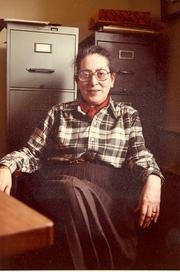Erika Bourguignon 1924-2015
Working with Dr. Erika Bourguignon was a significant turning point for Cuyamungue Insitute’s founder, Felicitas Goodman. In 1973 Felicitas worked with Erika on a comparative study of 488 indigenous societies around the world. They found that 90 percent used at least one culturally institutionalized method to experience an altered state of consciousness. This became a significant clue that launched Felicitas on the path to re-discover the ritual postures.

